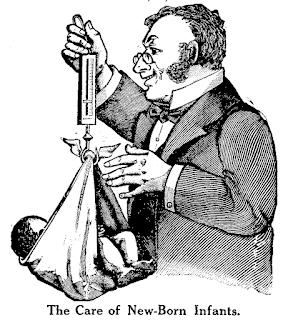December 12, 1912 [The Public and Private Care of Infants]
 While Griffith explores cinema's imagination, Edison, as he stated in The Saturday Evening Post, asserts that film will replace textbooks. Already I hear the outraged howls of schoolchildren, their beloved pratfalls and last-minute rescues usurped, their monkeyshines tarnished—then again, what better way to endure the school-day than with someone costumed like Washington crossing something that looks like the Delaware? But I suspect, as in his film on the care of infants, that Edison has greater aspirations: a complete visual education, immediate and detailed, from the nursery to the university, covering all trades and professions. Once more, by combining elements of the dramatic with the expository, the Wizard may be on to something, as pedantic as it may first appear.
While Griffith explores cinema's imagination, Edison, as he stated in The Saturday Evening Post, asserts that film will replace textbooks. Already I hear the outraged howls of schoolchildren, their beloved pratfalls and last-minute rescues usurped, their monkeyshines tarnished—then again, what better way to endure the school-day than with someone costumed like Washington crossing something that looks like the Delaware? But I suspect, as in his film on the care of infants, that Edison has greater aspirations: a complete visual education, immediate and detailed, from the nursery to the university, covering all trades and professions. Once more, by combining elements of the dramatic with the expository, the Wizard may be on to something, as pedantic as it may first appear.The widow with twins is forced to separate them—one is boarded, the other is sent off to the orphan asylum. I am reminded of Solomon's prank-ish wisdom--here, manifest as a pair, one of whom thrives, the other—wizened with malnourishment, crying in the overcrowded asylum—dies. A simple message: Individual care is best—the mother best of all.
I cannot deny that Edison's social experiment is bold—and here, his ideas radical. He is critical of orphanages and forces us to face the plight of poor women overburdened with children and unprotected by the laws—and they do not not need mere pity but a restructured society where compassion is more than drawn-down eyes and a head cocked in sympathy but new laws, better medical care—in short, a government solution. Oh, the laissez-faire mob will bellow and groan; however, if the only freedom left is free trade (and where have I heard that before?), then we are not free. My God enjoins me to take care of the least of us—and for this I'm willing to tear down that wall of separation between church and state and join Edison in his firm denunciation and ardent call.
Unfortunately, it appears this little film is not circulating much. I'd like to say I was fortunate to have managed to attend a screening, but this is a sad boon, if the poor remain always with us, and we do nothing about it.


Comments
Post a Comment